EPM5740 Project Risk Management: Risk Culture and Attitude Report
VerifiedAdded on 2022/12/18
|7
|908
|59
Report
AI Summary
This report examines the critical relationship between risk culture and risk attitude in project management, as required by the EPM5740 individual assignment. It defines risk culture as the shared values, beliefs, and understanding of risk within an organization, and risk attitude as the behavioral response to potential risks. The report explores how risk attitude influences risk culture and vice versa, emphasizing the importance of a positive risk attitude in fostering a strong risk culture. It highlights the benefits of building a good risk culture, including improved asset protection, enhanced reputation, and more effective risk management. The report outlines practical methods for implementing a positive risk culture, such as educating employees, establishing clear risk management processes, rewarding desirable risk behaviors, and employing risk managers. The conclusion reiterates the significant impact of both risk culture and attitude on the overall success of risk management initiatives.

Running head: Risk culture
Risk culture and risk attitude
Name of student
Name of the University
Author note
Risk culture and risk attitude
Name of student
Name of the University
Author note
Paraphrase This Document
Need a fresh take? Get an instant paraphrase of this document with our AI Paraphraser
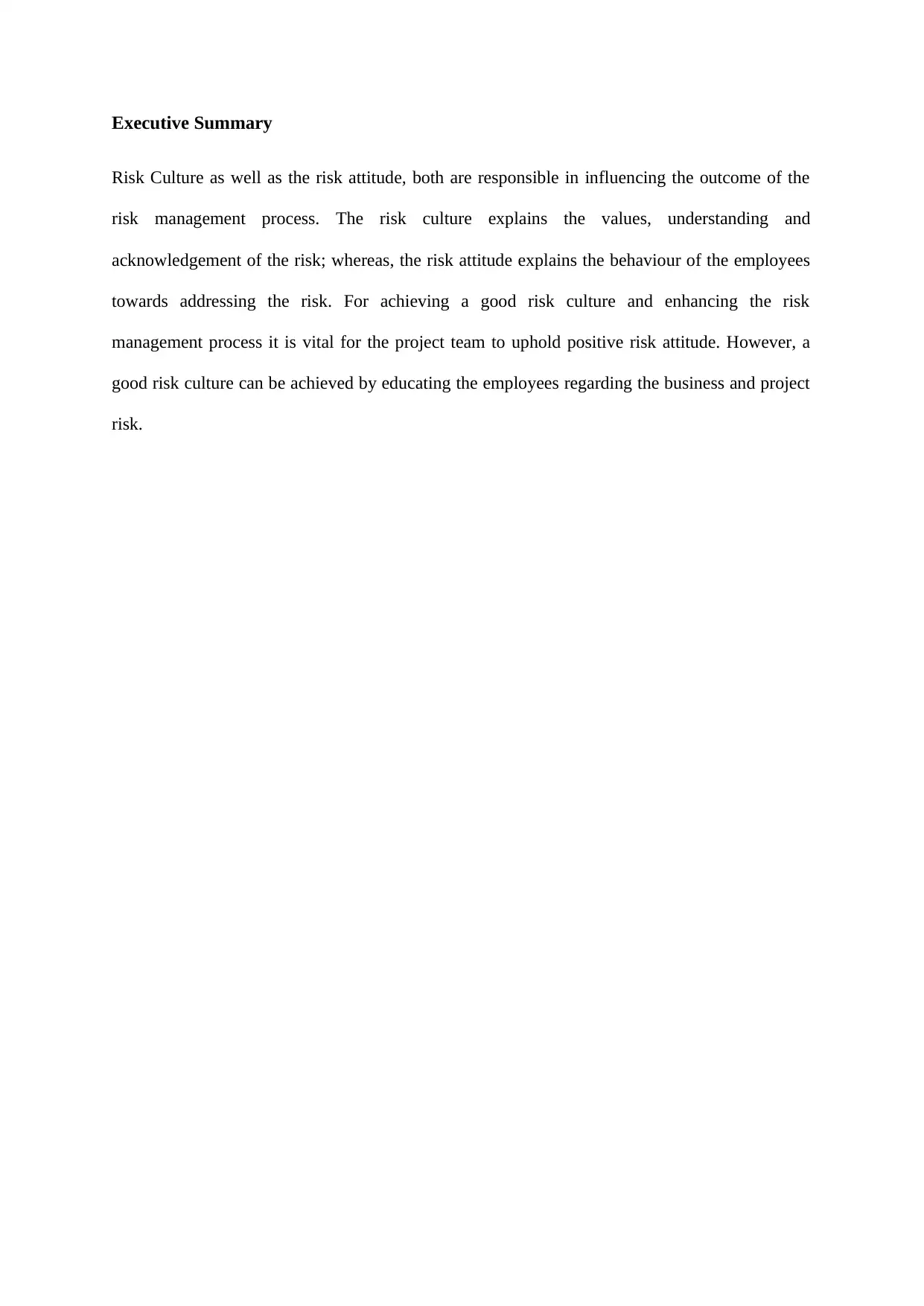
Executive Summary
Risk Culture as well as the risk attitude, both are responsible in influencing the outcome of the
risk management process. The risk culture explains the values, understanding and
acknowledgement of the risk; whereas, the risk attitude explains the behaviour of the employees
towards addressing the risk. For achieving a good risk culture and enhancing the risk
management process it is vital for the project team to uphold positive risk attitude. However, a
good risk culture can be achieved by educating the employees regarding the business and project
risk.
Risk Culture as well as the risk attitude, both are responsible in influencing the outcome of the
risk management process. The risk culture explains the values, understanding and
acknowledgement of the risk; whereas, the risk attitude explains the behaviour of the employees
towards addressing the risk. For achieving a good risk culture and enhancing the risk
management process it is vital for the project team to uphold positive risk attitude. However, a
good risk culture can be achieved by educating the employees regarding the business and project
risk.
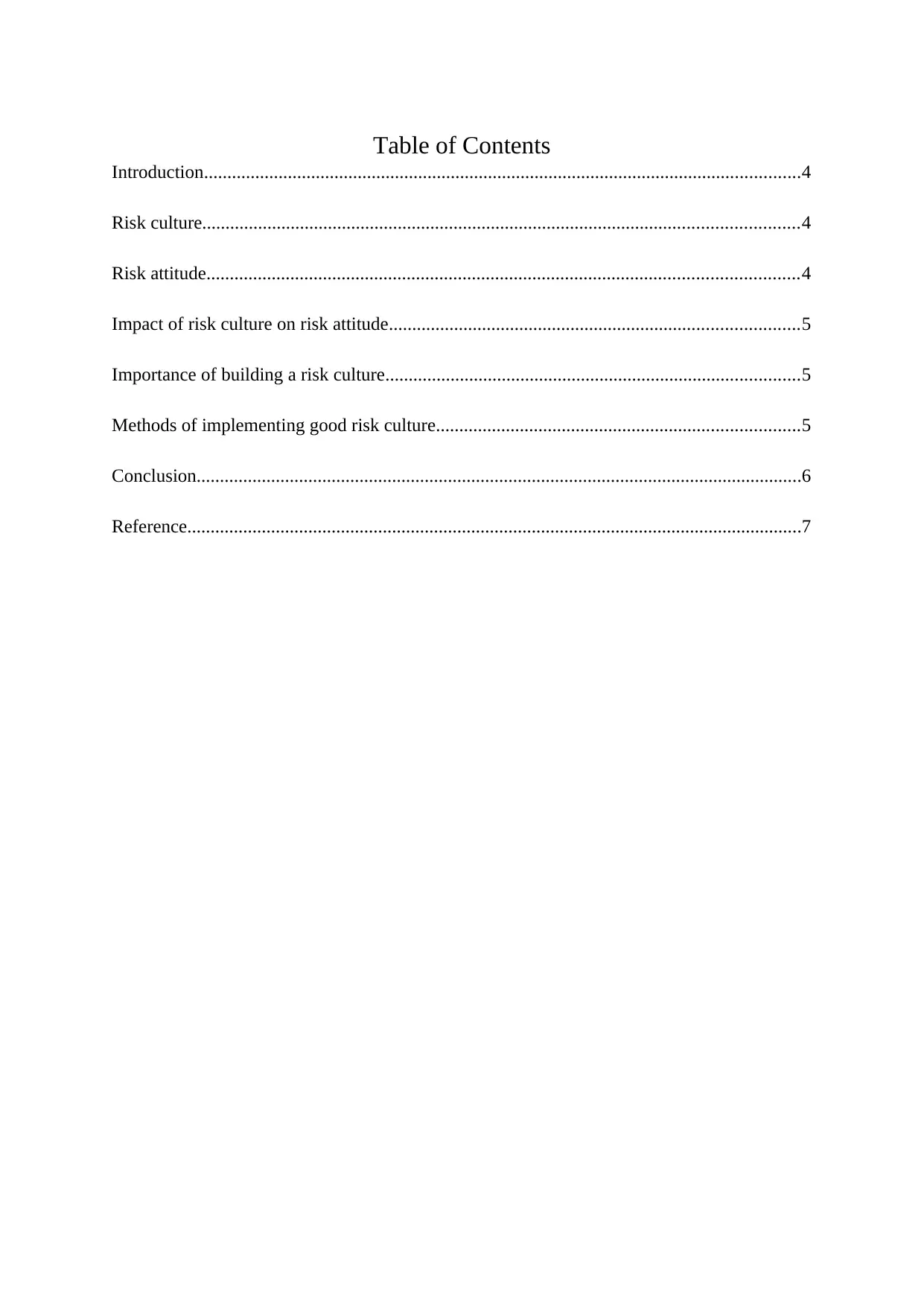
Table of Contents
Introduction................................................................................................................................4
Risk culture................................................................................................................................4
Risk attitude...............................................................................................................................4
Impact of risk culture on risk attitude........................................................................................5
Importance of building a risk culture.........................................................................................5
Methods of implementing good risk culture..............................................................................5
Conclusion..................................................................................................................................6
Reference....................................................................................................................................7
Introduction................................................................................................................................4
Risk culture................................................................................................................................4
Risk attitude...............................................................................................................................4
Impact of risk culture on risk attitude........................................................................................5
Importance of building a risk culture.........................................................................................5
Methods of implementing good risk culture..............................................................................5
Conclusion..................................................................................................................................6
Reference....................................................................................................................................7
⊘ This is a preview!⊘
Do you want full access?
Subscribe today to unlock all pages.

Trusted by 1+ million students worldwide
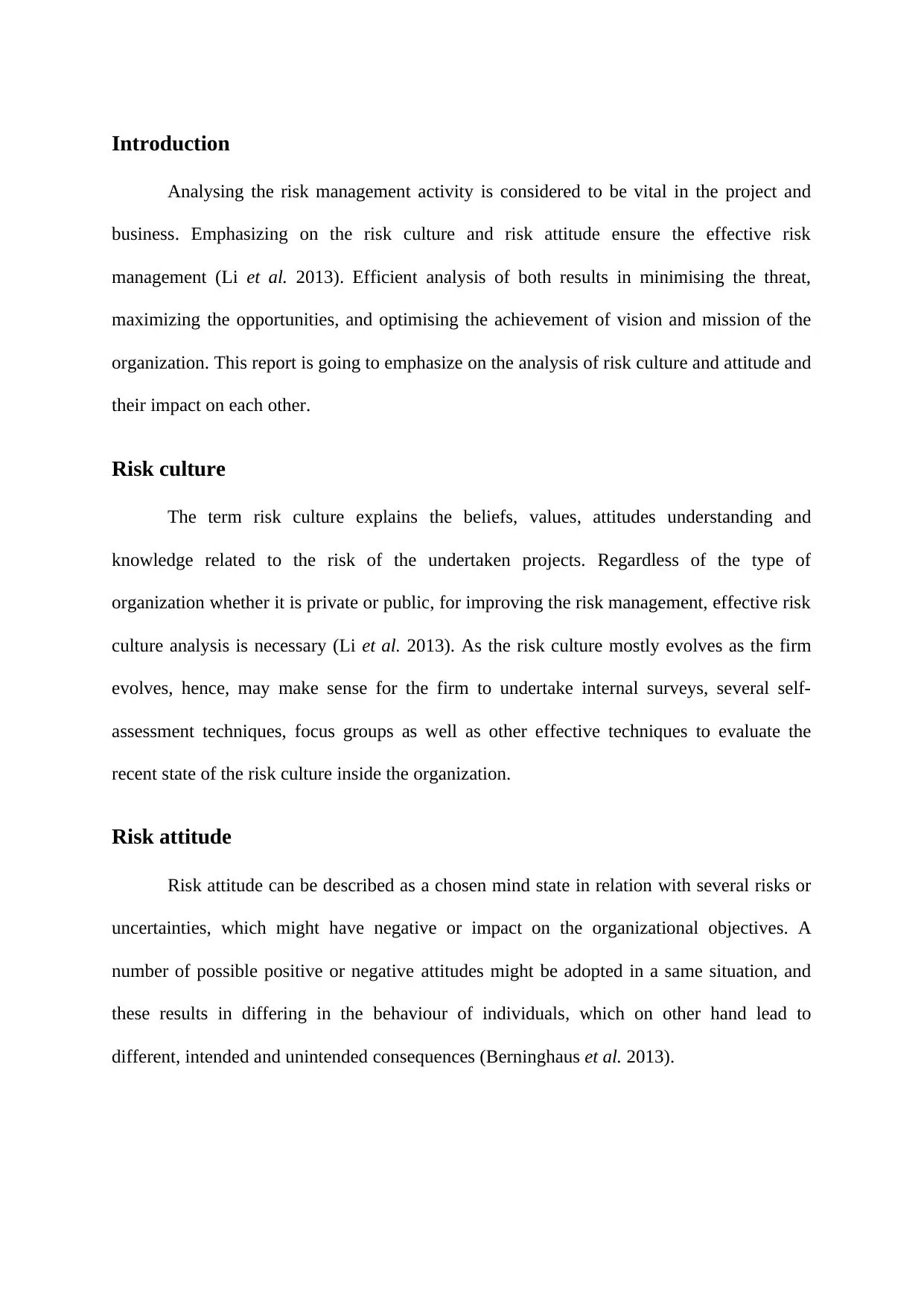
Introduction
Analysing the risk management activity is considered to be vital in the project and
business. Emphasizing on the risk culture and risk attitude ensure the effective risk
management (Li et al. 2013). Efficient analysis of both results in minimising the threat,
maximizing the opportunities, and optimising the achievement of vision and mission of the
organization. This report is going to emphasize on the analysis of risk culture and attitude and
their impact on each other.
Risk culture
The term risk culture explains the beliefs, values, attitudes understanding and
knowledge related to the risk of the undertaken projects. Regardless of the type of
organization whether it is private or public, for improving the risk management, effective risk
culture analysis is necessary (Li et al. 2013). As the risk culture mostly evolves as the firm
evolves, hence, may make sense for the firm to undertake internal surveys, several self-
assessment techniques, focus groups as well as other effective techniques to evaluate the
recent state of the risk culture inside the organization.
Risk attitude
Risk attitude can be described as a chosen mind state in relation with several risks or
uncertainties, which might have negative or impact on the organizational objectives. A
number of possible positive or negative attitudes might be adopted in a same situation, and
these results in differing in the behaviour of individuals, which on other hand lead to
different, intended and unintended consequences (Berninghaus et al. 2013).
Analysing the risk management activity is considered to be vital in the project and
business. Emphasizing on the risk culture and risk attitude ensure the effective risk
management (Li et al. 2013). Efficient analysis of both results in minimising the threat,
maximizing the opportunities, and optimising the achievement of vision and mission of the
organization. This report is going to emphasize on the analysis of risk culture and attitude and
their impact on each other.
Risk culture
The term risk culture explains the beliefs, values, attitudes understanding and
knowledge related to the risk of the undertaken projects. Regardless of the type of
organization whether it is private or public, for improving the risk management, effective risk
culture analysis is necessary (Li et al. 2013). As the risk culture mostly evolves as the firm
evolves, hence, may make sense for the firm to undertake internal surveys, several self-
assessment techniques, focus groups as well as other effective techniques to evaluate the
recent state of the risk culture inside the organization.
Risk attitude
Risk attitude can be described as a chosen mind state in relation with several risks or
uncertainties, which might have negative or impact on the organizational objectives. A
number of possible positive or negative attitudes might be adopted in a same situation, and
these results in differing in the behaviour of individuals, which on other hand lead to
different, intended and unintended consequences (Berninghaus et al. 2013).
Paraphrase This Document
Need a fresh take? Get an instant paraphrase of this document with our AI Paraphraser
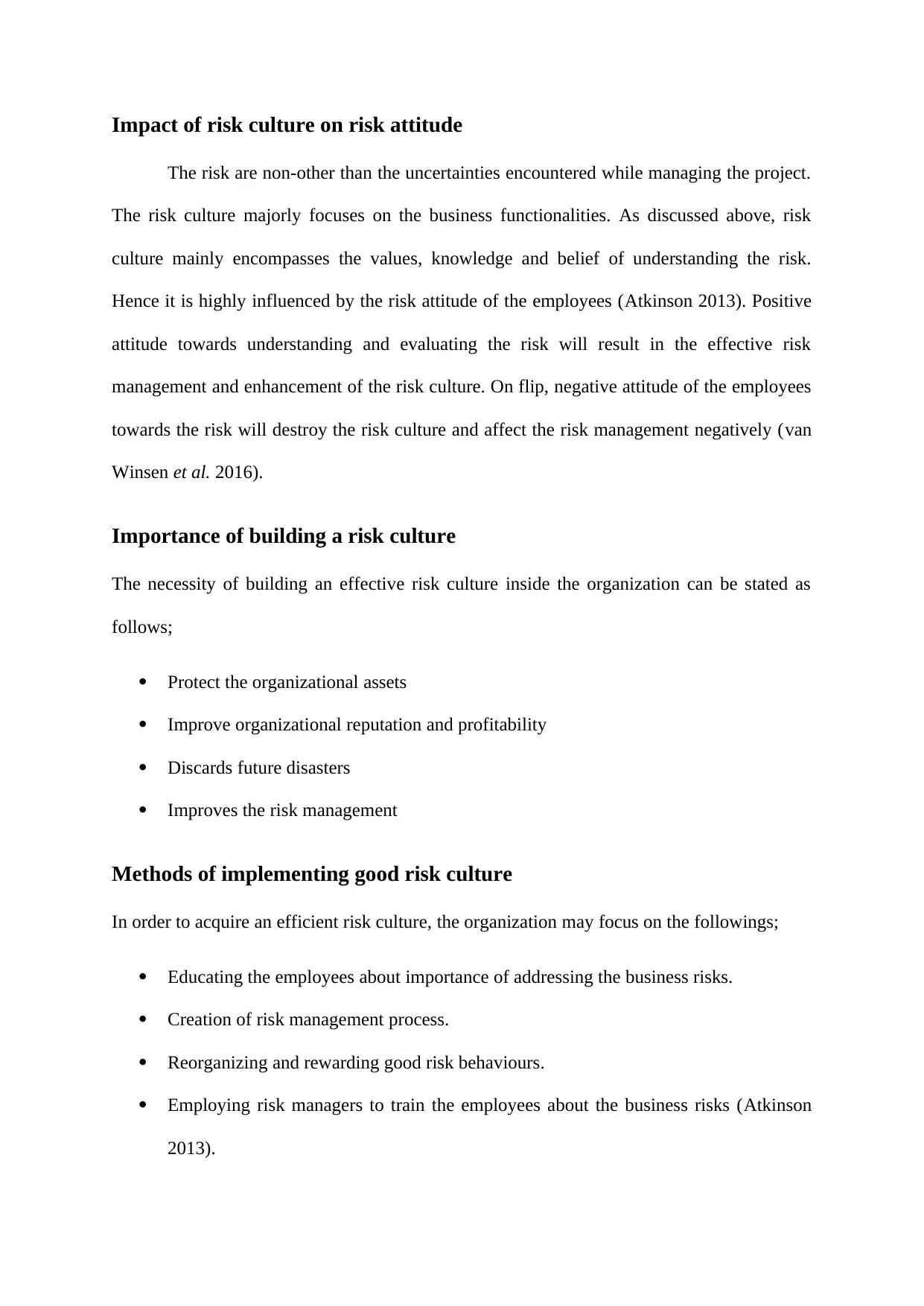
Impact of risk culture on risk attitude
The risk are non-other than the uncertainties encountered while managing the project.
The risk culture majorly focuses on the business functionalities. As discussed above, risk
culture mainly encompasses the values, knowledge and belief of understanding the risk.
Hence it is highly influenced by the risk attitude of the employees (Atkinson 2013). Positive
attitude towards understanding and evaluating the risk will result in the effective risk
management and enhancement of the risk culture. On flip, negative attitude of the employees
towards the risk will destroy the risk culture and affect the risk management negatively (van
Winsen et al. 2016).
Importance of building a risk culture
The necessity of building an effective risk culture inside the organization can be stated as
follows;
Protect the organizational assets
Improve organizational reputation and profitability
Discards future disasters
Improves the risk management
Methods of implementing good risk culture
In order to acquire an efficient risk culture, the organization may focus on the followings;
Educating the employees about importance of addressing the business risks.
Creation of risk management process.
Reorganizing and rewarding good risk behaviours.
Employing risk managers to train the employees about the business risks (Atkinson
2013).
The risk are non-other than the uncertainties encountered while managing the project.
The risk culture majorly focuses on the business functionalities. As discussed above, risk
culture mainly encompasses the values, knowledge and belief of understanding the risk.
Hence it is highly influenced by the risk attitude of the employees (Atkinson 2013). Positive
attitude towards understanding and evaluating the risk will result in the effective risk
management and enhancement of the risk culture. On flip, negative attitude of the employees
towards the risk will destroy the risk culture and affect the risk management negatively (van
Winsen et al. 2016).
Importance of building a risk culture
The necessity of building an effective risk culture inside the organization can be stated as
follows;
Protect the organizational assets
Improve organizational reputation and profitability
Discards future disasters
Improves the risk management
Methods of implementing good risk culture
In order to acquire an efficient risk culture, the organization may focus on the followings;
Educating the employees about importance of addressing the business risks.
Creation of risk management process.
Reorganizing and rewarding good risk behaviours.
Employing risk managers to train the employees about the business risks (Atkinson
2013).
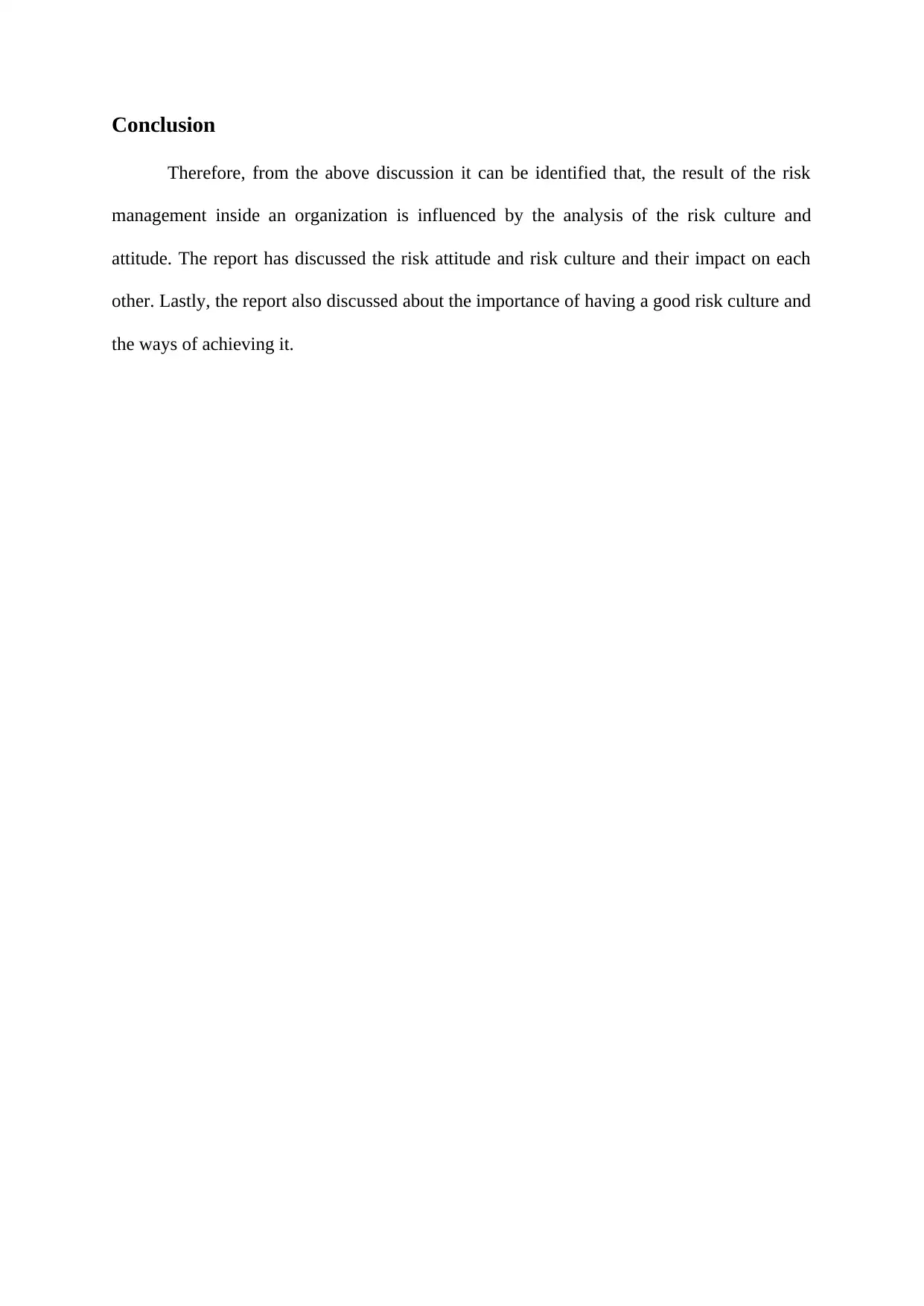
Conclusion
Therefore, from the above discussion it can be identified that, the result of the risk
management inside an organization is influenced by the analysis of the risk culture and
attitude. The report has discussed the risk attitude and risk culture and their impact on each
other. Lastly, the report also discussed about the importance of having a good risk culture and
the ways of achieving it.
Therefore, from the above discussion it can be identified that, the result of the risk
management inside an organization is influenced by the analysis of the risk culture and
attitude. The report has discussed the risk attitude and risk culture and their impact on each
other. Lastly, the report also discussed about the importance of having a good risk culture and
the ways of achieving it.
⊘ This is a preview!⊘
Do you want full access?
Subscribe today to unlock all pages.

Trusted by 1+ million students worldwide
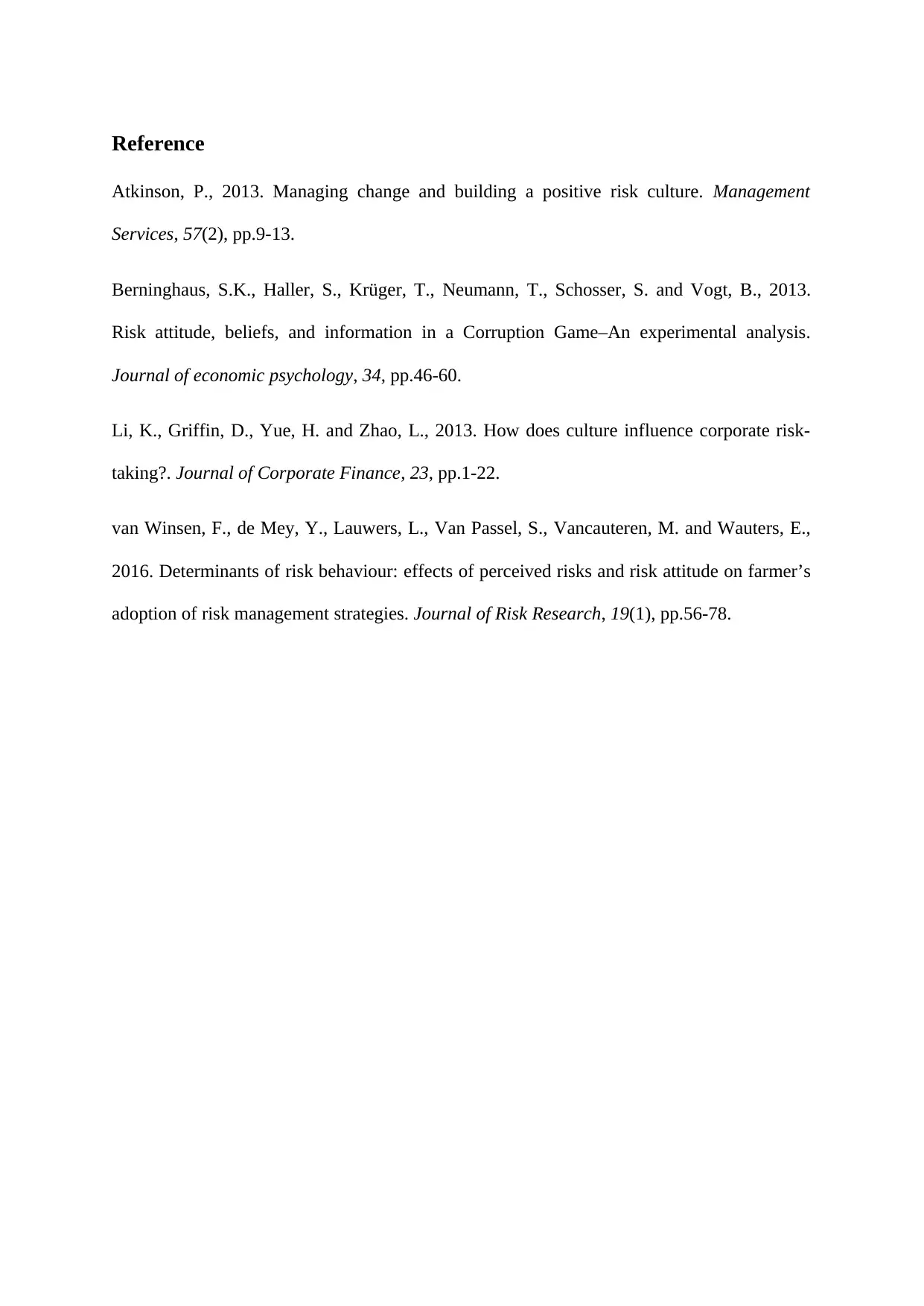
Reference
Atkinson, P., 2013. Managing change and building a positive risk culture. Management
Services, 57(2), pp.9-13.
Berninghaus, S.K., Haller, S., Krüger, T., Neumann, T., Schosser, S. and Vogt, B., 2013.
Risk attitude, beliefs, and information in a Corruption Game–An experimental analysis.
Journal of economic psychology, 34, pp.46-60.
Li, K., Griffin, D., Yue, H. and Zhao, L., 2013. How does culture influence corporate risk-
taking?. Journal of Corporate Finance, 23, pp.1-22.
van Winsen, F., de Mey, Y., Lauwers, L., Van Passel, S., Vancauteren, M. and Wauters, E.,
2016. Determinants of risk behaviour: effects of perceived risks and risk attitude on farmer’s
adoption of risk management strategies. Journal of Risk Research, 19(1), pp.56-78.
Atkinson, P., 2013. Managing change and building a positive risk culture. Management
Services, 57(2), pp.9-13.
Berninghaus, S.K., Haller, S., Krüger, T., Neumann, T., Schosser, S. and Vogt, B., 2013.
Risk attitude, beliefs, and information in a Corruption Game–An experimental analysis.
Journal of economic psychology, 34, pp.46-60.
Li, K., Griffin, D., Yue, H. and Zhao, L., 2013. How does culture influence corporate risk-
taking?. Journal of Corporate Finance, 23, pp.1-22.
van Winsen, F., de Mey, Y., Lauwers, L., Van Passel, S., Vancauteren, M. and Wauters, E.,
2016. Determinants of risk behaviour: effects of perceived risks and risk attitude on farmer’s
adoption of risk management strategies. Journal of Risk Research, 19(1), pp.56-78.
1 out of 7
Related Documents
Your All-in-One AI-Powered Toolkit for Academic Success.
+13062052269
info@desklib.com
Available 24*7 on WhatsApp / Email
![[object Object]](/_next/static/media/star-bottom.7253800d.svg)
Unlock your academic potential
Copyright © 2020–2026 A2Z Services. All Rights Reserved. Developed and managed by ZUCOL.




